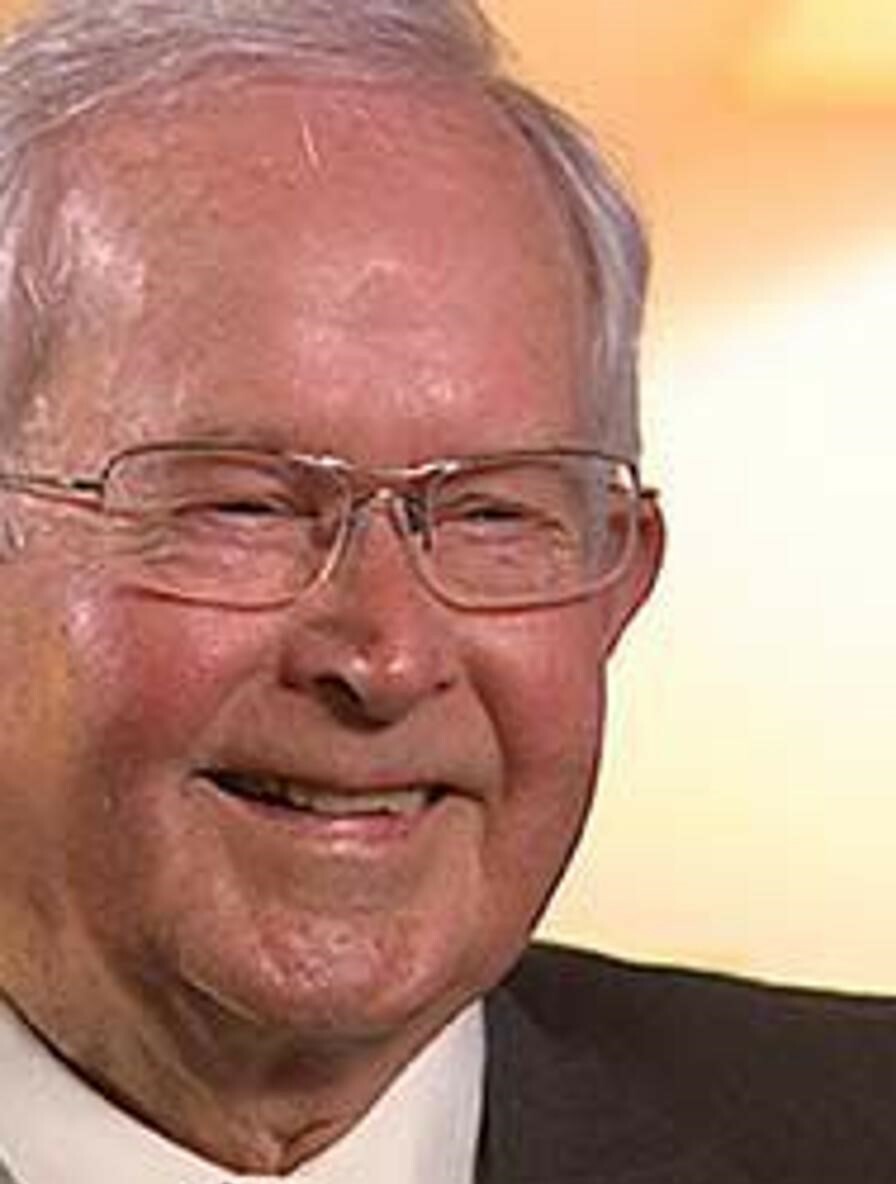


Obituary of Phil Batt
Philip E. Batt—farmer, musician, writer, and Idaho’s 29th governor—died on his 96th birthday, March 4, 2023. Governor Brad Little has ordered flags to be flown at half-staff until Batt’s interment.
Batt’s body will lie in state at the Idaho State Capitol beginning at 10am Thursday, March 9th until 10am Friday, March 10th for the public to pay their respects.
Philip E. Batt was the youngest of five children born to John Batt and Elizabeth Karn Batt, who farmed at Wilder. Batt began working on the farm at the age of seven, and his family appreciated his innate work ethic along with his sunny personality. He played violin and clarinet, liked to sing, and relished life on the farm and in town with his siblings and friends. He was very social. After his two brothers joined the Army during WWII, he joined the Army Air Corps at the age of 17. He was called to active duty when he was 18, just six months before the end of the war in Japan.
Batt had completed his basic training in Mississippi and, in later years, vividly recalled encountering appalling racial segregation during that time, an experience that inspired his career-long support for civil and human rights issues. His desire to dignify marginalized people solidified and expanded as he recognized that changes were needed closer at home, bettering the conditions of Idaho farm workers.
Batt believed in the dignity of all, and he believed in the democratic process. Early in his political career, at the end of a grueling hop harvest, Batt jumped up on a flatbed truck to thank his farm workers and to encourage them to go vote. Through the efforts of his foreman Manuel Zamora, who was interpreting into Spanish, Batt exhorted his exhausted crew to go vote that fall. “I don’t care who you vote for. I don’t care if you vote for me or not. But you have the right to vote as much as anybody in this country—so go vote!” Later, as a Legislator, Batt sponsored the bill creating the Idaho Human Rights Commission, and last year the Boise-based Wassmuth Center for Human Rights Education announced that it would name its soon to be completed education building, The Philip E. Batt Building.
Upon his return from military service, Batt enrolled at the University of Idaho using his G.I. stipend, formed a dance band, and studied chemical engineering. After two years, his father’s illness forced him to leave school and return to the family farm to work. He grew onions and hops for many years in Wilder and, at age 36, was the youngest person ever elected President of the National Hop Association.
While at the University he met Jacque Fallis and they were married in 1948. They were married for 66 years until her death in 2014. He and Jacque had three children: William, Rebecca, and Leslie Ann. The family enjoyed life on the farm which included a menagerie of pets and many Sunday drives to nearby mountains. Friends, family, and neighbors would organize caravans of farm trucks, each truck bed filled with a jumble of fishing poles, picnic baskets, kids, cousins, dogs, and beer. Phil and Jacque enjoyed life immensely, hosting and attending regular dinner and bridge parties, and they both became licensed private pilots. Their small plane, shared with other farmers, allowed the family to enjoy Sunday outings to far flung places like McCall and other beautiful Idaho destinations. And Phil Batt loved Idaho.
Batt’s brother John had been elected to the Idaho House of Representatives and, after John decided not to seek re-election, Phil ran for the office and won. He was part of the historic 1965 session that passed Idaho’s first (3-cent) sales tax, that managed judicial reform, and that carried out a court-ordered reapportionment. He was then elected to the Idaho State Senate in 1966 and, with the exception of two years during which he returned to farming, served until 1979. This service included being elected majority leader and President Pro Tempore.
In 1978, he was elected Lieutenant Governor, and in 1982 he unsuccessfully ran for Governor. In 1984 and 1986 he was again elected to the Senate, resigning in 1987 when then-Gov. Cecil D. Andrus appointed him to the Idaho Board of Transportation. The Department of Transportation named its headquarters building after him in 2013.
In 1990, Batt was elected chair of the Idaho Republican Party. He often said he believed in the “big tent” concept of the party, and focused on finding good candidates to run for office. After scouting for gubernatorial candidates for the 1994 election, Batt decided to run himself and was successful. Taking office on a snowy day in 1995, he later quipped that this was the cold day which some of his detractors had predicted—if he ever won the chief executive’s spot.
Batt’s four years in office were highlighted by his unwavering support for human rights, including his decision to become his own liaison to Idaho’s Native American tribes; for negotiating an agreement with the U.S. Navy for disposal of nuclear waste, a controversial decision that was upheld by Idahoans voting in 1996; expanding Workers Compensation to include farm workers; forming a “Committee of One” to look at the relationship between substance abuse and the state’s growing prison population; establishing the Governor’s Hispanic Initiative to recognize Idaho’s fastest-growing minority; and supporting the addition of a College of Engineering at Boise State University. In 2019, Gov. Otter, assisted by Governor-Elect Little, presented Batt with the Idaho Medal of Achievement Award, Idaho’s highest honor.
Although he easily would have won a second term, Batt left office after four years, saying he believed in self-imposed term limits. But he was much more than a politician. He was a writer who wrote poetry, music, newspaper columns, and two books, The Compleat Phil Batt: A Kaleidoscope, and Life as a Geezer. He was a musician who played clarinet with jazz icons Gene Harris, Lionel Hampton, Curtis Stigers and many others, including Chet Atkins. Often in collaboration with Marguerite Lawrence, he also took his clarinet to play alongside elementary school bands and orchestras any time they visited the Statehouse rotunda. He was a witty punster who loved animals and who kept a pet mynah bird—with an interesting vocabulary—in his State Senate office.
Phil went on to enjoy his retirement living at Willow Park Retirement Center for a time. Even though he characterized himself as a terrible golfer, he continued weekly golf games for years with a large group of friends who could never determine his scoring system. He also enjoyed the tradition of Batt staff lunches at Yen Ching for years after leaving office, especially on his birthday.
Phil met and in 2015 married Francee Reilly. They made their home in Boise and enjoyed travel, golf outings, neighborhood gatherings centered around music, and family celebrations. Phil developed strong connections with Francee’s children and grandchildren.
He was preceded in death by his parents and his siblings Emma, James, John, and Ruth, along with his wife Jacque Elaine Fallis Batt, and his sons-in-law John Randel Hart (Rebecca Batt) and Thomas Raymond Corbet (Leslie Ann Batt Corbet).
He is survived by his wife, Francee, his children William James (Cathy Naugle) Batt, Rebecca Sue Batt, and Leslie Ann Batt Corbet, along with a number of beloved grandchildren, great grandchildren, nieces, nephews and cousins on both his and Francee’s sides.
Governor Batt is also survived by Jim and Eva Gay Yost who—while not blood relatives—have served selflessly as extraordinarily loyal and involved supporters throughout Batt’s political career, his writing career, and even now. Jim and Eva Gay are selflessly organizing memorial events while delighting all with their generous, funny, and kind spirits.
Funeral services will be held at the Cathedral of the Rockies on Friday, March 10, at 11 am with reception immediately following in the adjacent Emmaus Room. Private Interment for family and invited friends will follow at the Wilder Cemetery. Arrangements are under the direction of Flahiff Funeral Chapel, Caldwell, and the Idaho Military Division. The family extends a sincere thank you to Plantation Place Assisted Living for their loving care to Phil Batt.
Governor Batt would wish memorial contributions be directed to the Wassmuth Center for Human Rights through their website at wassmuthcenter.org.
To live stream Phil's service please copy and paste the following link:
https://boxcast.tv/view/gov-phil-batt-funeral-service-kuc7uz2uenwsgxfpivki
To send flowers to the family or plant a tree in memory of Phil Batt, please visit Tribute StoreLie in State
Lie in State
Funeral Service
Interment


Copyright © 2024 | Terms of use & privacy Policy

 LIVE CHAT
LIVE CHAT Call Us
Call Us Live Chat
Live Chat